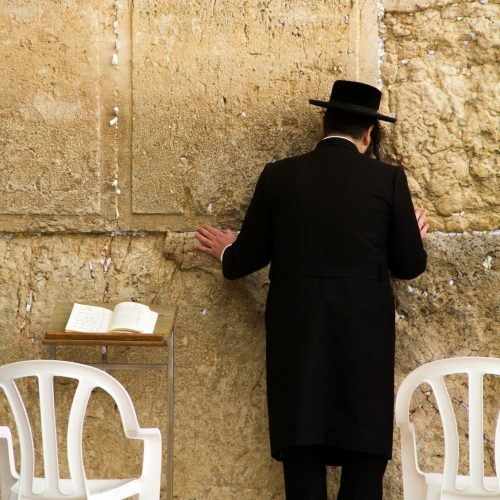To touch the live wire of the conflict in Israel is to invite an explosion of strong opinion. But instead of focusing on the political happenings with the geographical & political state of Israel, I want to address the biblical & spiritual nature of Israel. Considering whether or not we’re obligated to support Israel depends on what you mean by “Israel.” In the Bible, Israel can mean two different entities–a nation & a people. Israel as a state is a political ally, but is it a spiritual partner?
I tried to clarify in last Sunday’s message that Christianity is not the same as Judaism (watch it here). So how is Israel related to the Church? The Apostle Paul spoke of Israel as a tree with branches (Rom. 11:13-26). It was as if the national, physical Israel of the Hebrew Scriptures was the roots & trunk, but the branches were the people. To be a true Israelite was a matter of the heart, not heritage. It wasn’t about being one outwardly (by ethnicity or culture) but inwardly (by faith). Within the nation of Israel, there was always a “true” Israel made up of those who obeyed & served God.
The purpose of Israel was to prepare the way for the coming of the Messiah. That’s the special role it was chosen for (Rom. 9:1-5; Acts 13:32-33; 28:20). When Jesus, the promised Jewish Messiah, arrived to carry out His redemptive mission, new branches became grafted in as Gentiles became believers, while branches of unbelieving Jewish people were broken off. They were pruned away because they were no longer in a right relationship with God. That tree is now the Church because it’s the people of God composed of both Jews & Gentiles who follow Jesus–a spiritual nation & kingdom (1 Pet. 2:9, Luke 17:20-21).
The purpose of the physical nation had been fulfilled & retired, having no more reason for existence. No longer is there a distinction between Jews & Gentiles, which was God’s plan from the beginning (Rom. 10:12-13; Eph. 2:11-16; Gal. 3:28). So in a sense the Church is the new “Israel of God” (Gal. 3:7, 29, 6:16; Phil. 3:2-3; Rom. 2:28-29). Many Old Testament prophecies about Israel (Jerusalem, Zion, the temple) are fulfilled in the new Israel, new Jerusalem & new spiritual temple (1 Pet. 2:5, Gal. 4:26, Heb. 12:22).
God had been “married” to Israel (as seen in Hosea), but “divorced” the nation for its unfaithfulness. Through idolatry & immorality, the nation broke the (marriage) covenant which was conditioned on their continuing obedience & faithfulness. National Israel was annihilated in AD 70 when the Temple was destroyed & the Jewish people dispersed, as Jesus foretold due to their rejection (Luke 19:41-44). That was like God’s writ of divorce as He sent them away. The Church is now the bride of Christ (Eph. 5:25-27). It shares both continuity & discontinuity with Israel, not completely replacing it, but transforming & expanding it. There’s just one people of God throughout history, not two.
So what about physical Jewish people today, & the political state of Israel? Modern Israelis are not the Israelites under the rule of God’s laws, leaders & prophets. Individual Jews who receive Jesus are part of the true Israel of God, just as are Gentiles who do. Unbelieving Jewish people are not. Though Christians disagree about any future role for Israel in God’s plan, remember that their role was completed so God no longer has a need for a nation like that. Jesus fulfilled the Law, & brought a new & better covenant (Jer. 31:31, Heb. 8:6-13).
So does the “Holy Land” belong to the Jewish people forever? When the word “forever” is used in the Hebrew of the Old Testament it sometimes means “eternal,” but not always. It often just means “until the end of the age”–that would be the Old Testament age, Before Christ. God never intended for the physical nation of Israel to last eternally, but only perpetually until it had fulfilled its purpose. The same word for “forever” was also applied to circumcision (as a covenant sign), the Passover, Sabbath observance, Day of Atonement, Aaronic priesthood & more (Gen. 17:13; Ex. 12:24; 31:16-17, 40:15; Lev. 16:29, 32). It was to last only as long as the Old Covenant lasted.
God’s forever promises to Old Testament Israel are ultimately fulfilled in Christ. He’s the “seed of Abraham” through whom the promises come to the family of God & body of Christ (Gal. 3:29). Jesus is the final sacrifice–there’s no longer a need for a physical temple, altar, or priesthood. That’s what the book of Hebrews is all about in the New Testament. There’s no need to reinstate anything about the Jewish religion. The way “all Israel will be saved” is by becoming part of spiritual Israel–the Church (Rom. 9:6, 11:26). There are not two ways to be right with God–through both Judaism & Christianity–just one way through Jesus (John 14:6, Acts 4:12).
So whatever claim anyone has over Israel/Palestine/the Holy Land is a matter of politics, not theology. Whatever battles are fought today in the Middle East may have theological roots, but are not divinely authorized. To bless “Israel” as the people of God today (Gen. 12:3) is to support the Church.


